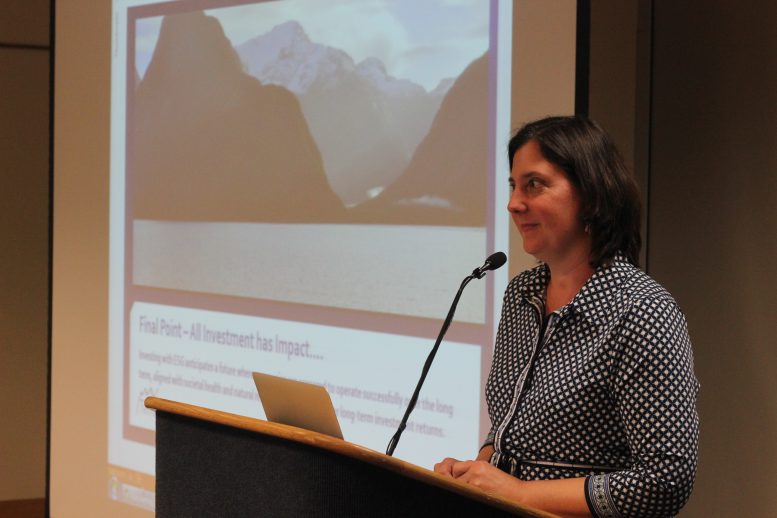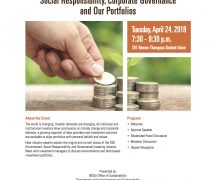By DAVID DUPONT
BG Independent News
Companies that pursue policies that help the environment can also help investors’ bottom-line.
That’s the foundation of the strategy of Terra Alpha Investment, said Amy Dine, director of advocacy for the company. Dine served as keynote speaker at a Socially Responsible Investing Workshop held Tuesday at Bowling Green State University.
Formed three years ago, Terra Alpha Investments uses measures of environmental productivity to determine which companies it will invest in.
This approach is not “a niche,” Dine said, nor a fad. Sustainable investing, she said, represented about 20 percent of all professionally managed funds in 2016, about $8.72 trillion. That’s up, she said, by 33 percent, from 2014, and expected to grow when 2018 figures are reported.
Investor putting their money where their values are, is not a new approach, Dine said.
It began with investors who wanted to invest their money in companies that aligned with their religious faith, or at least, disinvest from tobacco, liquor, and other “sin”-related firms.
That approach, Dine said, foundered some because the returns did not match the market.
Still faith-based investing remains strong. The BGSU workshop was co-sponsored by Munn Wealth Management, a Maumee firm heavily engaged in faith-based investing.
The second wave of values-based investment was prompted, Dine said, by activists in the 1970s and 1980s, looking for ways to protest apartheid in South Africa, industrial disasters including the nuclear meltdown at Chernobyl and the chemical release at Bhopal, India, as well as domestic concerns such as brownfield sites.
These activists saw having proxy votes as a way to sway corporate behavior.
Now the third way uses corporate practices to decide which companies to invest in.
This is more than protest, but a realization that those companies paying attention to how they use natural resources, that are diligent about the treatment of those in their supply chain, and that govern in a transparent and for long-term success are just better companies, she said.
Chemistry Professor Neocles Leontis, one of those who organized the session, introduced Dine by saying when the coral reef is dying in the south and ice is melting in the far north, these are issues investors need to be paying attention to.
Dine said this does not mean only new, cutting edge companies get supported.
General Motors is developing a landfill-free plant, where everything is reused or recycled, saving $1 billion in the process. Adidas has a shoe that is made with 95-percent recycled plastic pulled from the sea around the Maldives. FedEx has redesigned its airplanes to make them morefuelefficient, and also made improvements to its truck fleet. It saved $840 million a year.
And Starbucks, a company now embroiled in charges stemming from the arrest of two African-American men, just days before that incident had promised to develop a completely recyclable cup and get rid of plastic stirrers.
Now, Dine said, about 2,200 publicly listed companies report on their environmental impact, giving investors the information they need. That’s a start, she said, given there are 7,000 publicly listed companies.
More changes are in store, Dine said. Social media has become “a weapon of choice” is sounding off against corporate policies. She noted how quickly Dick’s and Walmart acted to stop selling some weapons after the Parkview school shooting.
Millennials are more driven by their values. “They don’t buy from companies they don’t like. They won’t work for a company if they’re not proud of what it does.”
Following her talk, Dine joined Darren Munn, of Camelot Portfolios which is a sister company to Munn Wealth Management, and Robert Huesman, a senior investment associate 19/19 Investment Counsel, on a panel to further discuss the issues Dine raised.
Serving as moderator, Josh Mudse, of Munn Wealth Management, asked the panel what the advantages of actively management of funds, as opposed to index funds.
In an actively managed fund, the manager engages with companies on the investor’s behalf, Dine said.
Huesman said that while some studies fund actively managed funds do no better than index fund, those studies they don’t necessarily take into account full business cycles.
Mudse also noted that even if those studies find 70 percent of actively managed funds match or underperform the market, it means 30 percent are outperforming it. Investors should find those funds.
Munn said that many of the funds covered in those studies are “closet indexers” who don’t really deviate much at all from index funds.
Mudse concluded the panel discussing by asking: “How are you proactive in values-based investing?”
Dine said Terra Alpha was in discussions with a food company about getting their water use data. All the data was available in house, but they were reluctant to disclose it. Was the data thorough enough?
Finally the Terra Alpha attorney convinced them if it was good enough for their internal purposes, it was good enough to release. So the company disclosed its water-use data.
Huesman said 19/19 has gotten companies it invests in to end “predatory lending practices.”
He also said the company buys bonds that directly support particular environmental projects such as a Starbucks move to make sure cocoa growers in their supply chain are receiving a living wage.
Munn said that many of his faith-based investors value life in all its forms. Why would they invest in a tobacco company that is promoting smoking among children as young as 10 in developing countries?
“We don’t want to own a company that does that.”
He said his companies also is involved in many local projects in line with its values. “We’re putting our money where our mouth is.”


